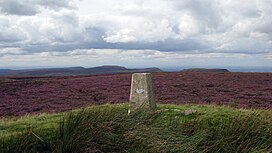Our website is made possible by displaying online advertisements to our visitors.
Please consider supporting us by disabling your ad blocker.
Urra Moor
| Urra Moor | |
|---|---|
 Round Hill, the summit of Urra Moor | |
| Highest point | |
| Elevation | 454 m (1,490 ft) |
| Prominence | 409 m (1,342 ft) |
| Listing | Marilyn |
| Geography | |
 | |
| Location | North York Moors, England |
| OS grid | NZ594015 |
| Topo map | OS Landranger 93 |
Urra Moor is the highest moor in the North York Moors, North Yorkshire, England.[1] At 1,490 feet (454 m) above sea level it is the highest point in Hambleton District and the North York Moors National Park,[2] and the fourteenth most prominent hill in England.[3] The name is a mix of Old English and Old Norse (horh and haugr) which means The Dirty Hill.[4] The name of Urra Moor applies to the moor as a whole; the summit itself is known as Round Hill.[5]
The summit is crowned by a trig point, and a track passes about 110 yards (100 m) to the south of this point. This track forms part of the route of both the Lyke Wake Walk and the Cleveland Way,[6] and also forms the most commonly used route of ascent for Urra Moor. It is 1.9 miles (3 km) from the car park at Clay Bank to the summit via this route; total ascent is just under 660 feet (200 m).[6]
Urra Moor is noted for its prehistoric remains.[7] There are a number of barrows, and several carved rocks, including some cup and ring carvings. Probably the most striking relic is the Face Stone, a carved stone about 3 feet 3 inches (1 m) in height into which has been carved the shape of a face.[8]

- ^ Blow, John (14 March 2022). "Spring air another incentive to visit landmarks". The Yorkshire Post. p. 18. ISSN 0963-1496.
- ^ Chrystal, Paul (2017). The Place Names of Yorkshire. Catrine: Stenlake. p. 86. ISBN 9781840337532.
- ^ "Marilyns of England". www.peakbagger.com. Retrieved 23 November 2020.
- ^ Watts, Victor (2004). The Cambridge dictionary of English place-names : based on the collections of the English Place-Name Society (1 ed.). New York: Cambridge University Press. p. 639. ISBN 0-521-36209-1.
- ^ Dillon, Paddy (2011). The North York Moors (2 ed.). Cumbria: Cicerone. pp. 91–92. ISBN 978-1-84965-102-8.
- ^ a b "OL 26" (Map). North York Moors Western Area. 1:25,000. Explorer. Ordnance Survey. 2016. ISBN 9780319242650.
- ^ Historic England. "Urra Moor prehistoric linear boundary on the western edge of Urra Moor (1015955)". National Heritage List for England. Retrieved 7 August 2017.
- ^ Wainwright, Martin (2 October 2007). "Yorkshire's mysterious stone sculptor unmasked". The Guardian. Retrieved 7 August 2017.
Previous Page Next Page


